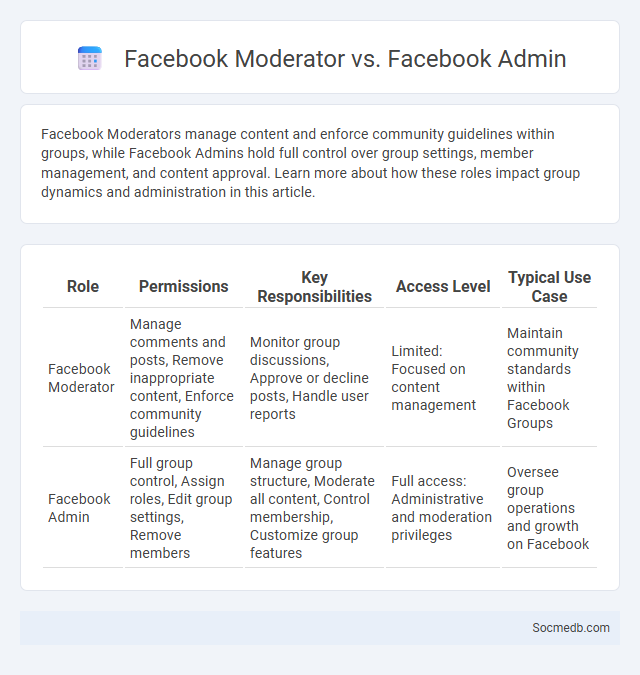
Photo illustration: Facebook Moderator vs Facebook Admin
Facebook Moderators manage content and enforce community guidelines within groups, while Facebook Admins hold full control over group settings, member management, and content approval. Learn more about how these roles impact group dynamics and administration in this article.
Table of Comparison
| Role | Permissions | Key Responsibilities | Access Level | Typical Use Case |
|---|---|---|---|---|
| Facebook Moderator | Manage comments and posts, Remove inappropriate content, Enforce community guidelines | Monitor group discussions, Approve or decline posts, Handle user reports | Limited: Focused on content management | Maintain community standards within Facebook Groups |
| Facebook Admin | Full group control, Assign roles, Edit group settings, Remove members | Manage group structure, Moderate all content, Control membership, Customize group features | Full access: Administrative and moderation privileges | Oversee group operations and growth on Facebook |
Introduction to Facebook Roles
Facebook roles define specific levels of access and permissions within Facebook Pages, enhancing team collaboration and content management. These roles include Admin, Editor, Moderator, Advertiser, and Analyst, each offering distinct capabilities such as publishing content, managing ads, or analyzing page insights. Understanding Facebook roles optimizes page security and ensures efficient management by assigning appropriate responsibilities to team members.
What is a Facebook Moderator?
A Facebook Moderator is responsible for managing and monitoring content on Facebook pages and groups to ensure community guidelines are followed and harmful or inappropriate content is removed promptly. By enforcing rules and engaging with users, they maintain a safe and positive environment for your online community. Effective moderation helps enhance user experience and protects your brand's reputation on the platform.
What is a Facebook Admin?
A Facebook Admin is the person responsible for managing a Facebook Page or Group, overseeing content publication, member interactions, and privacy settings. This role includes moderating posts, approving or removing comments, and managing page roles and permissions to ensure the community remains safe and engaging. Effective Facebook Admins leverage tools like Insights to analyze audience engagement and optimize content strategy.
Key Responsibilities of Facebook Moderators
Facebook Moderators review user-generated content to ensure compliance with community standards, focusing on identifying and removing hate speech, misinformation, and graphic violence. They monitor posts, comments, and images around the clock to maintain a safe and respectful online environment for millions of users globally. Regularly updating their knowledge of evolving platform policies and engaging in collaborative decision-making with the moderation team ensures effective content governance.
Key Responsibilities of Facebook Admins
Facebook admins manage page content by creating, scheduling, and monitoring posts to boost engagement and maintain brand consistency. They respond to user comments and messages promptly, ensuring timely communication and fostering a positive online community. Your role also includes analyzing page insights and metrics to optimize strategies and enhance audience reach effectively.
Differences Between Moderator and Admin
Moderators primarily oversee conversations, enforce community guidelines, and manage user interactions to maintain a healthy environment, while admins hold higher-level permissions including setting platform policies, managing user roles, and configuring system settings. Admins have the authority to add or remove moderators and adjust site-wide features, whereas moderators operate within the parameters set by admins. The distinction lies in scope of control, with admins focusing on overall governance and moderators concentrating on day-to-day moderation tasks.
Permissions Comparison: Moderator vs Admin
Moderators have permissions primarily centered on content management, such as approving posts, deleting inappropriate comments, and enforcing community guidelines, but they typically lack access to sensitive settings like user bans or platform-wide configurations. Admins possess comprehensive permissions, including the ability to modify site settings, manage user roles, oversee security protocols, and access detailed analytics for community performance. The clear distinction in permissions impacts the level of control and responsibility each role holds within social media platforms.
Choosing the Right Role for Your Group or Page
Selecting the appropriate role for your social media group or page is crucial for effective management and content moderation. Assign roles such as admin, moderator, or editor based on members' expertise and trustworthiness to maintain a safe and engaging community. By aligning your team's skills with specific responsibilities, you ensure smoother operations and enhanced user experience on your platform.
Best Practices for Admins and Moderators
Effective social media administration involves consistent enforcement of community guidelines to maintain a respectful and engaging environment. Moderators should utilize advanced moderation tools and analytics to promptly address inappropriate content and understand user behavior trends. Encouraging transparent communication and regular feedback loops with users enhances trust and fosters a positive online community.
Conclusion: Selecting Your Facebook Team
Selecting your Facebook team requires identifying skilled individuals proficient in content creation, community management, and targeted advertising to maximize engagement. Prioritize team members with data analytics expertise to track performance metrics and optimize campaign outcomes. Empower your team with clear roles and collaborative tools to ensure efficient workflow and consistent brand voice across all Facebook interactions.
 socmedb.com
socmedb.com